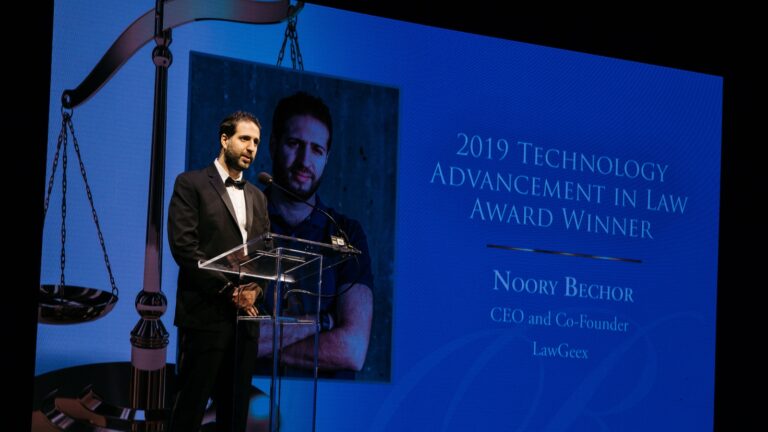LawGeex wants to bring the legal profession into the 21st century in the same way that Uber transformed transportation by taking it online.
“After healthcare, legal services are the second-biggest service industry in the US, worth some $400 billion,” says Noory Bechor, CEO and founder of LawGeex. “But nearly all of it is done offline through traditional law firms. Only 1 percent is online right now, mostly through companies like LegalZoom, which can help you create contracts.”
LawGeex represents the flip side of LegalZoom. If you’re on the receiving end of a contract – for a new job, a lease, or stock options for that new startup you’re about to launch – upload the document to the LawGeex website and within 24 hours, you’ll have an annotated review complete with notes on what’s missing, what’s dicey and what’s non-standard.
The review is written in plain English and includes helpful statistics such as “94 percent of leases don’t include this clause,” so you know if you’re about to get taken for a ride.
Bechor gives an example. “Let’s say a landlord has put in a clause stating he can kick you out of the apartment with no notice. Or he’s banned pets. All of these things can be flagged” so you can challenge the contract or choose not to proceed.
For one-off employment contracts and leases, LawGeex is free. For other types of contracts – LawGeex handles 20 different types, from non-compete and non-disclosure agreements to the inscrutable terms of service found on nearly every website and app – you can pay $50 a pop or buy a monthly subscription starting at $80 for two contracts and going up to $600 a month for small- to medium-sized enterprises with lots of legal documents to review on a regular basis.

LawGeex uses artificial intelligence, machine learning and sophisticated algorithms to compare your contract with the thousands it has in its growing database, some from well-established companies like Google, Facebook and Apple. It then does something decidedly low-tech – it runs your contract by a human lawyer for quality assurance.
“We want to make sure that the feedback we send our customers is 100% accurate,” Bechor tells ISRAEL21c. “And it helps us improve the product.”
Although most contracts use similar language, 71% of contracts analyzed by LawGeex have at least one unusual or missing clause, Bechor says. “It only takes one problematic clause to put you at risk,” the company’s website warns.
Not gibberish
Bechor came up with the idea for LawGeex when he was starting his career as a lawyer specializing in contracts atMeitar Liquornik Geva Leshem Tal, Israel’s largest law firm.
“Being a lawyer, I could see that the world of contracts is much less complex than it seems to a layperson,” Bechor says. “It might look like gibberish to a non-lawyer, but if you review tens and hundreds of contracts, one after another, you start to see patterns. The legal language is very structured.”
Since recognizing patterns is what computers do best, Bechor thoughtto outsource tedious and repetitive contract-review to a machine.
As a result, LawGeex’s service is intended to appeal not only to consumers and small businesses but also to law firms.
“The math is relatively simple,” Bechor says. “Either the firm has to hire someone to handle the work, or they might outsource it to another firm, for example to India.” The business of legal process outsourcing (LPO) is growing 30% a year, he adds.
The consumer market for contract review is growing too. Bechor sites statistics from the American Bar Association that 33% of Americans said they needed a lawyer in the last 12 months. Why not an artificially intelligent one at a fraction of the price?
LawGeex raised $2.5 million earlier this year and has 15 staffers, including several US-trained lawyers who are part of LawGeex’s R&D team but in the future may offer full legal services to LawGeex customers.
While a LawGeex review will show you what to delete and suggest language to add to a contract, “If you want someone to hold your hand and fix the contract for you, you’ll be able to click a button and send the contract” to a live LawGeexlawyer, Bechor says. He expects the price to be reasonable, since “the computer will still be doing 80-95 percent of the heavy lifting.”
English only
As the service grows, Bechor hopes to hire freelance attorneyswho’ve immigrated from the US to Israel.
LawGeex launched in January and already has thousands of users – a mix of individuals and paying companies, Bechor says. Tax advisory leader Deloitte uses LawGeex, as do social-media monitoring site Brandwatch and Israeli cybersecurity firm Ironscales.
Israelis looking for help with contracts in Hebrew are out of luck – for now and probably forever.
“There’s not a lot of knowhow out there related to Hebrew text analysis,” Bechor admits. “For us to review a Hebrew contract, we’d have to really reinvent the wheel.”
Fortunately, high-tech contracts in Israel and elsewhere are increasingly written in English, no matter the local lingo.
LawGeex doesn’t have any direct competition right now, but signs point to an increasing demand for automated legal services. LegalZoomraised $266 million, while online document-signing technology provider DocuSign last raised money at a valuation of $3 billion.
If online legal services are just a fraction of the total today, Bechor sees that jumping to 10 percent within the next few years – with LawGeex as an integral part of the industry’s growth.
For more information, click here

















